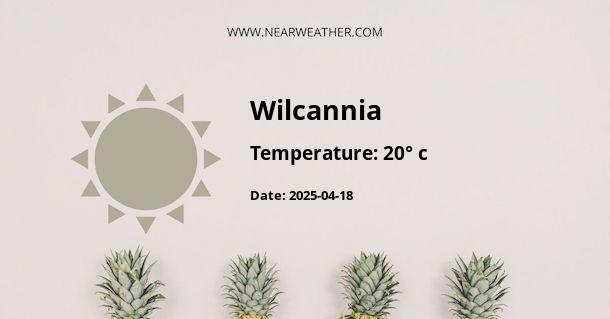Climate and Weather in Wilcannia, Australia
Wilcannia is a small town located in the far western region of New South Wales, Australia. Known for its rich history and stunning natural landscapes, Wilcannia experiences a unique climate characterized by hot summers, mild winters, and low rainfall throughout the year. In this article, we will explore the climate and weather patterns in Wilcannia, providing a comprehensive overview of what to expect throughout the year.
Temperature
The temperature in Wilcannia can vary significantly between seasons, with hot summers and mild winters. During the summer months (December to February), the average maximum temperature ranges from 35°C to 40°C (95°F to 104°F), with occasional heatwaves pushing the mercury even higher. Nights are generally warm, with temperatures ranging from 18°C to 22°C (64°F to 72°F).
Winter in Wilcannia (June to August) brings milder temperatures, with average maximums ranging from 15°C to 20°C (59°F to 68°F). Nights can get chilly, with temperatures dropping to around 3°C to 7°C (37°F to 45°F). Frost is not uncommon during the winter months, particularly in June and July.
Rainfall
Wilcannia is known for its arid climate, with low rainfall throughout the year. The town receives an average annual rainfall of around 250 millimeters (9.8 inches). The majority of the rainfall occurs during the summer months, with occasional thunderstorms bringing relief from the heat. However, it is important to note that rainfall in Wilcannia can be highly variable from year to year, with some years experiencing drought conditions.
During the winter months, rainfall is scarce, with only a few millimeters recorded on average. This dry period contributes to the arid nature of the region, with vegetation adapted to survive in these harsh conditions.
Sunshine Hours
Wilcannia enjoys a high number of sunshine hours throughout the year, making it an ideal destination for those seeking warm and sunny weather. On average, Wilcannia experiences around 3,300 hours of sunshine annually, with the summer months receiving the highest amount of sunlight.
Wind
Wind is a common feature in Wilcannia, particularly during the spring months (September to November). The region experiences strong winds, known as "willy-willies," which are whirlwinds that can occur during periods of intense heat. These winds can reach speeds of up to 50 kilometers per hour (31 miles per hour) and are often associated with dust storms.
Floods
Wilcannia is located near the Darling River, and flooding can occur during periods of heavy rainfall. The town has experienced significant floods in the past, with the most notable being the 1956 flood, which caused widespread damage. Flood mitigation measures have been implemented over the years to minimize the impact of flooding on the town and its residents.
Climate Change
Like many other regions around the world, Wilcannia is not immune to the effects of climate change. Rising temperatures, prolonged droughts, and increased frequency of extreme weather events are some of the challenges faced by the town and its surrounding areas. These changes have implications for agriculture, water management, and overall community resilience.
Conclusion
Wilcannia experiences a hot desert climate with hot summers, mild winters, and low rainfall throughout the year. The town's unique climate, combined with its rich history and natural beauty, makes it an intriguing destination for those interested in exploring the Australian outback. Visitors to Wilcannia should be prepared for the heat during the summer months and the potential for chilly nights during winter. The town's arid conditions and occasional floods reflect the delicate balance between the natural environment and human habitation in this remote part of Australia.
A - Wilcannia's Latitude is -31.566669 & Longitude is 143.383331.
A - Weather in Wilcannia is 21° today.
A - Climate Conditions in Wilcannia shows clear sky today.
A - Humidity in Wilcannia is 28% today.
A - Wind speed in Wilcannia is 12.71 km/h, flowing at 53° wind direction. today.
